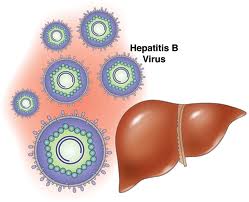Hepatitis B is a viral infection caused by the Hepatitis B virus (HBV). This virus is capable of causing life-long infection, liver cirrhosis (scaring), liver failure, liver cancer and death.

Causes:
As mentioned above the cause of Hepatitis B is the virus- HBV. The virus spreads when blood from an infected person enters the body of a non-infected person. This virus enters the blood stream and reaches the liver where it reproduces and releases large numbers of new viruses into the bloodstream. HBV can survive outside the body for at least 7 days and can still be capable of causing infection.
HBV is mainly found in the blood of infected individuals. Saliva, semen, vaginal secretions and breast milk also contain the virus but in lower concentrations as compared to the blood. Feces, nasal secretions, sputum, sweat, tears, urine and vomit have not been implicated in the spread of Hepatitis B. Unless they are visibly contaminated with blood, the risk of contracting hepatitis B from these fluids is practically nonexistent. Hepatitis B is not transmitted by casual contact, hugging, by sharing eating utensils, through food or water, etc.
After a person has been exposed to the HBV, the blood test (HBsAg) will become positive on an average within 4 weeks (range 1- 9 weeks). Usually within 15 weeks of onset of the symptoms, this test becomes negative in most individuals (except those who have developed chronic infection).
Risk factors for developing Hepatitis B:
- Sexual contact with an infected individual
- Sexual contact with multiple partners
- Male homosexual contact
- Intravenous drug abuse (due to sharing of infected needles)
- Health care workers (due to close contact with infected individuals)
- Occupational blood exposure
- Sharing toothbrushes, razors, etc
- From an infected mother to new-born infant
- Chronic renal failure patients on Dialysis
- Tattooing, piercing of skin (ears, lips, navel, etc)
- Dental procedure
- Medical procedures (including transfusion of blood or blood products)
- Staying with a chronic Hepatitis B patient
- Traveling to countries which have a high prevalence of Hepatitis B
It must be noted that people of any age, sex, race or nationality can be infected by this virus.
Symptoms:
Sometimes a person with HBV infection may not have any symptoms at all. In patients who do develop symptoms, they occur on an average of about 12 weeks (range 9-21 weeks) after exposure to hepatitis B virus. About 70% of the patients develop symptoms of Hepatitis B. The symptoms include:
- Jaundice: Yellowness of skin and/or sclera (white portion of the eyes)
- Loss of appetite
- Abdominal discomfort
- Nausea with or without vomiting
- Dark yellow urine
- Clay colored stools
- Lethargy, fatigue
- Body ache, joint pain, etc
About Chronic Hepatitis B infection:
Chronic Hepatitis B means that the body did not get rid of the virus when the patient was first infected with HBV thus leading to long-term HBV infection. The younger the age group at the time of first infection with this virus, the higher is the chance of developing chronic HBV infection. Thus almost 90% of infected infants, about 30% of infected children between 1-5 years of age and only 2- 6% of infected people above 5 years of age will develop chronic infection.
Carriers of Hepatitis B are those individuals who are capable of transmitting the virus to other individuals. Majority of hepatitis B carriers are asymptomatic (displaying no symptoms) whereas only 30% of them show symptoms of the disease.
Homeopathic Treatment:
Homeopathy is known to work to the immunological level, and has proven its efficacy in the treatment of a wide range of viral infections. With homeopathic medicines, the cases of Hepatitis B are better controlled, the process of cirrhosis is well kept under check and symptomatic relief is also obtained very well. Homeopathic treatment can also help in delaying the complications of Hepatitis B (such as cirrhosis and liver cancer) as far as possible. It may also be noted that the treatment for chronic Hepatitis B has to be planned for a longer duration of time. The best part of homeopathic treatment is that the disease is kept under control and general health improved without any kind of side-effects whatsoever.





